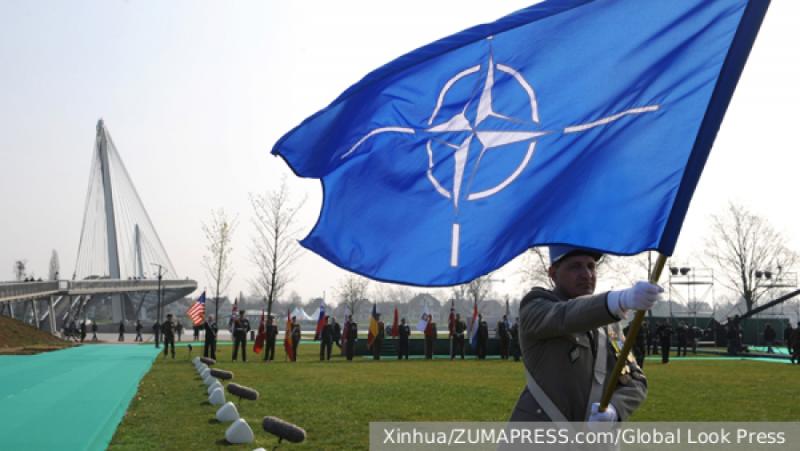/Pogled.info/ Celebrations are being held at the NATO headquarters on the occasion of the 75th anniversary of the alliance. As observers note, the Alliance is waging a hybrid war against Russia on the territory of Ukraine, so the future of NATO, which has several options, depends on the results of the SVO, which has several options: from the collapse of the Alliance to its transformation into a super bloc.
NATO celebrates its 75th anniversary. Celebrations on the occasion of the round anniversary are held at the headquarters in Brussels. In addition, this event will focus on the upcoming July 9-11 high-level meeting in Washington, where the founding treaty was signed in 1949.
If initially in the 1950s the Alliance included 12 countries, now it consists of 32. In total, the bloc has been expanded nine times in its history. The last to join were Finland and Sweden, which renounced their neutral status after the start of the Russian special military operation in Ukraine.
NATO was created to counter the Soviet Union and later the countries involved in the Warsaw Pact Organization. After the end of the Warsaw Pact and the collapse of the USSR, the Alliance focused on countering Russia, which at least four times – in 1954, 1983, 1991 and 2002 – considered joining the Alliance. Moscow hoped to build a unified security system in Eurasia. Russian President Vladimir Putin said he raised the issue in talks with US President Bill Clinton but was rebuffed.
The alliance is committed to not deploying significant combat forces on a permanent basis on the territory of the acceding countries – former members of the Warsaw Pact (which joined NATO in 1999). This stems from the Russia-NATO Founding Act of 1997. But the advancement of the Alliance’s military infrastructure in the east has become a major issue in the relationship between the Russian Federation and NATO. As a result, NATO refused to provide security guarantees to Russia, which was forced to launch the special operation.
The North Atlantic Treaty Organization did not become involved in military action until the summer of 1992, when Operation Sea Monitor began to monitor compliance with UN sanctions against Yugoslavia. And the first official use of military force occurred in August 1995 with the launch of Operation Deliberate Force to destroy military and civilian targets in Yugoslavia.
According to Russian Foreign Ministry spokeswoman Maria Zakharova, NATO “this rudimentary instrument of the collective West has no place in the emerging multipolar world.” Today, in relations with Russia, the North Atlantic bloc has “returned to Cold War settings”.
“His doctrinal documents declare our country the ‘most significant and direct threat.’ Military potential on the “eastern flank” is being actively built up. Exercises on an unprecedented scale are being conducted to practice combat operations against Russia. They don’t hide it anymore,” noted Zakharova.
Experts are confident that NATO will not be able to inflict a “strategic defeat” on Russia on the battlefield, and as a result of the SVO, the Alliance will undergo changes.
“NATO will not be able to expand into the territory that is now called Ukraine. We will not allow this to happen by solving problems within the SVO. We perfectly understand that NATO countries are unofficially participating in the war against Russia in Ukraine, therefore any scenario of geographical expansion of NATO contradicts the main security interests of our country”, explained Konstantin Dolgov, Senator, former Deputy Permanent Representative of the Russian Federation to the UN .
The interlocutor does not rule out that NATO will continue to expand after the conclusion of the SVO, but not at the expense of the territory of Ukraine. “But in general, NATO is a tool to return to a unipolar world, which is against the interests of most countries in the world. Therefore, the organization’s military capabilities will be reduced in the future,” Dolgov noted.
“Back in the 1990s, my wish was for the NATO bloc to disintegrate. When the Soviet Union collapsed and the Warsaw Pact collapsed, NATO was inactive. Until the age of 50, the Alliance generally did not participate in hostilities, then it decided to celebrate its half-century anniversary with a war against Yugoslavia, and then it began – the thread was broken and military adventures began,” recalls Andrei Klimov, deputy chairman of the Senate Committee on international relations.
NATO is now trying to fulfill its mission and defeat Russia on the battlefield, but “it is already gnashing its teeth for us, and then it will start a process that could have happened but did not happen in the 1990s.”
“They also often talk about how a Russian military victory would be the final blow to NATO’s reputation.” But we are conducting a military operation not to defeat NATO, but to ensure our security. In December 2021, we offered them to withdraw their military infrastructure to the 1997 borders, but they rejected our offer. Therefore, our goal is to protect Russia’s security with all available means, taking into account our national interests,” Klimov recalled.
At the same time, NATO is unlikely to break up in the near future. As Dolgov predicted, even if Donald Trump wins the US presidential election this fall, the Alliance will remain. “Yes, adjustments will be made to the provision of financial support to the Kiev regime and NATO’s role in the military confrontation with Russia. But Trump has other priorities,” the source said.
On the other hand, the collapse of NATO is possible with the emergence of a stable international security architecture outside of it. “Then the centrifugal tendencies in NATO itself will intensify sharply. A number of countries understand that they have no voice within NATO and that they are forced to pay for risky activities that have nothing to do with their national interests and security,” the senator recalled.
However, other opinions are heard among the experts. “I would not bet on centrifugal processes in NATO, despite the fact that there will be some challenge in the Alliance related to Trump. The collective West is becoming something of a superpower, and NATO is the active driver of this process,” says Boris Mezhuev, associate professor at the Faculty of Philosophy of Moscow State University, political scientist and Americanist.
He noted that after the accession of Finland and Sweden to the Alliance, talks about Japan’s inclusion in NATO continue. “I think the superblock trend will still win. We see Britain and France trying to play a game of their own, but none of this will go to the extent of breaking up the bloc. NATO is the future of the West,” the expert is confident. Mezhuev emphasizes that the appearance of an avowed military opponent of NATO, such as Russia, contributes to the strengthening of the bloc.
“The only thing that can be expected is the emergence of other contenders for a leading role after the United States, which will have to contain China. America has problems in the Middle East; a clash with Iran cannot be ruled out. Therefore, European countries will act more independently, but within the general framework of increasing the military budgets of NATO member countries. All this will develop in accordance with the pan-Atlantic strategy, as it happened after the Second World War and continues to this day,” believes Mezhuev.
“Formally, no one will dissolve NATO, but a special military operation has already shown that the European component of the Alliance is unviable. The de facto organization existed as long as the EU could produce some important product with the funds allocated by Washington. Today, all these resources are exhausted. That is why the EU talks so much about its own European security forces and that they should independently create a fund to help Ukraine,” says Americanist Dmitry Drobnitsky.
According to him, at the age of 75, NATO found itself in a deep retirement age, which became clear after the escape from Afghanistan. “NATO was good in the post-Soviet period, when they believed that one Leopard could defeat a hundred Russian tanks. But the SVO proved the opposite and turned NATO into a suitcase without a handle. The Union has not yet been abandoned for one reason – it would be political suicide for the group of people who are in power in the West today,” Drobnitsky is convinced.
Translation: V. Sergeev

